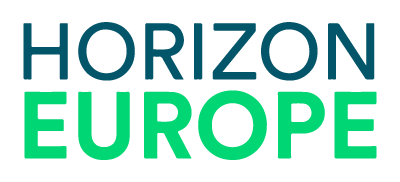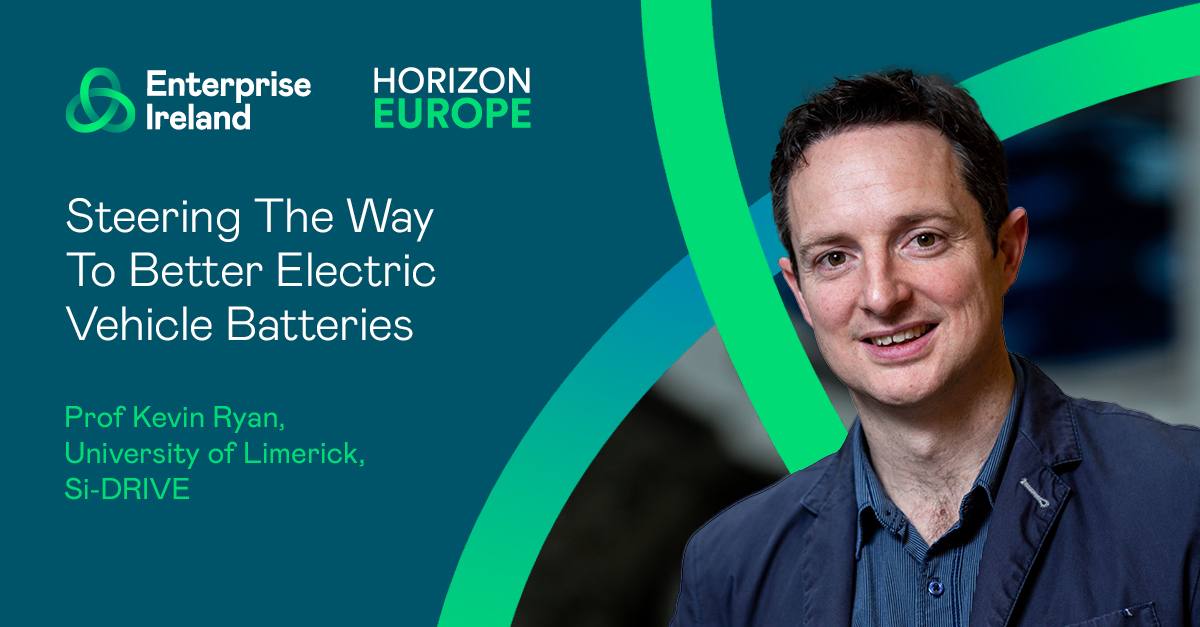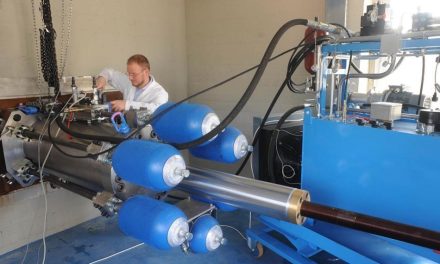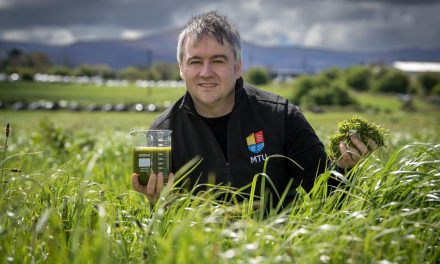The drive to Net Zero and the need for all of us to help reduce emissions means that electric vehicles (EVs) need to become completely commonplace. The rate of EV uptake needs to improve, however, and for that to happen, EV batteries need to be cheaper, recharge faster and enable vehicles to go further without needing to be charged.
One Irish-led consortium is hoping to make that happen, with its innovative re-imagination of the lithium-ion (Li-ion) battery. The Si-DRIVE* group is developing the next generation of rechargeable Li-ion batteries in a four-year project funded to the tune of €8m by the European Union through the Horizon 2020 programme.
Driving a pan-European project from Ireland
Kevin Ryan, Professor of Chemical Nanotechnology at the University of Limerick (UL), is the co-ordinator of the Si-DRIVE project. He works closely with Dr Hugh Geaney and Dr Tadhg Kennedy, his UL colleagues, and leads a 16-strong consortium consisting of partners in academia and industry in Ireland, Belgium, France, Germany, Italy, The Netherlands, Spain and Switzerland.
“By developing a better Li-ion battery that increases the driving range of EVs, cuts both costs and recharge times, and makes for more cost-effective recycling,” he explains, “Si-DRIVE is tackling the major barriers to electric vehicle (EV) uptake and allowing for the development of cost-competitive mass market EVs.”
The project will also boost European competitiveness in the battery arena, while also contributing to cuts in greenhouse gas emissions. Furthermore, it will help protect EV users.
“The Si-DRIVE technology will exceed the stringent demands of EV batteries where safety is paramount,” says Professor Ryan. “It will do this by dramatically improving each component within the accepted Li-ion platform and achieving this in a competitive way, taking the full life of the battery into account.”
The Si-DRIVE battery will have what is called ‘second use applications’, meaning it can be repurposed and reused in contexts with lower energy requirements when it is no longer powerful enough for its primary application in electric vehicles. “This is consistent with the principles of the circular economy,” he adds.
Cutting-edge innovation in practice
The work of the consortium is built on a novel silicon-based chemistry giving significantly higher energy density for longer range with faster charging at a lower cost than conventional batteries.
Supported by Science Foundation Ireland funding, Ryan and his team of 20 researchers had already developed these technologies for generating silicon in nanowire form. With the EU funding, he is now working on bringing this research forward to develop a prototype battery.
“Our project consortium has expertise at all battery component levels through to battery manufacture and end users,” he explains. “No one institution could deliver significant advances in such a short timescale. The collective skill set enabled by this funding is second to none and world leading.”
The consortium expertise spans material design and synthesis, electrochemical testing, prototype formation and production method validation, life cycle assessment and recycling process development, he adds.
How to set up for success
While it goes without saying that in-depth technical knowledge of the relevant research area is a basic requirement for any funding applicants, Professor Ryan points out that applicants need other skills too as challenges can arise.
“Leading a consortium of 16 partners can certainly present challenges from a coordination and management perspective,” he says. “A delay with one partner can have a knock-on impact on the entire consortium. This needs to be minimised through regular meetings at work-package and consortium level.”
He adds that the benefits far outweigh the challenges and ripple beyond the specific goals of any individual project. “Co-ordinating a Horizon 2020 grant application and resulting project is a fantastic way to build the reputation of your institute as a leader in a key area of research.”
Professor Ryan also recommends engaging with Enterprise Ireland and availing of the expert advice and support it can give anyone planning to apply for European Union funding.
“The support we got from Enterprise Ireland at the project preparation stage was invaluable,” he says. “In addition, the National Contact Point (NCP) for Horizon Europe funding relating to climate, energy and mobility provided excellent support in liaising with other NCPs in other countries and sharing insights into EU policy in battery research funding.”
*Si-DRIVE derives its name from the full project title: Silicon Alloying Anodes for High Energy Density Batteries comprising Lithium Rich Cathodes and Safe Ionic Liquid based Electrolytes for Enhanced High VoltagE Performance
If you would like advice about accessing Horizon Europe support or further details, please contact horizonsupport@enterprise-ireland.com or visit www.horizoneurope.ie





